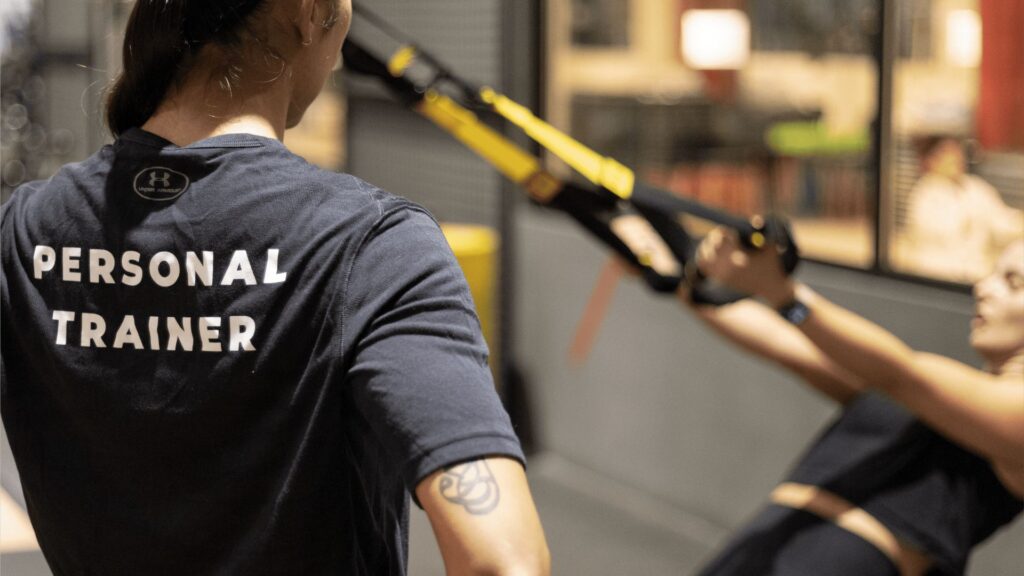What Is the Job Description of a Personal Trainer in Dubai?
A personal trainer helps the general public reach their fitness goals. They provide a personalized
workout regime, emotional support, and motivation to help their clients succeed. They must also
have good communication skills, be understanding, and know how to work with people.
Additionally, they should have knowledge and experience in exercise techniques, human
physiology, and first aid. They should also have an affinity for physical fitness and must be able
to form relationships and gain the trust of their clients. A personal trainer should also
meticulously record and track their client’s progress.

How To Start Your Own Fitness Business As A Personal Trainer In Dubai?
Step 1: Apply For A Freelance Permit
To apply for a freelance permit to start a personal training business in Dubai, you must complete a few requirements, including obtaining a visa. Check your country’s embassy in the UAE for an approved list of professionals eligible for a freelance visa.
Once you have a visa, you must register as a freelance professional with the Dubai Development
Authority (DDA). You can do this online by submitting a scanned copy of your passport,
self-declaration form, NOC, completed application form, recent photo, professional CV,
academic certificates, two professional references, and a letter of intent. The DDA will usually
issue you the permit within two business days after evaluating your application and the
documents.
Next, you must apply for a business license in a UAE-free zone like Fujairah Creative City. You
can do this directly or by working with a company formation expert. Also, apply for a work
permit from Dubai’s General Authority of Youth & Sports Welfare.
To do this, you must provide some details and essential documentation, including a completed application form, passport copy of the proposed owner or owners, two colored photos, LOE, KYC, application form, proof of address, and a business activity questionnaire.
Once the application process is complete, all company documents will usually be issued within a week. After this, you are ready to start your fitness business in Dubai.
Step 2: Choose A Business Setup
When starting a fitness business in Dubai, there are many business structures you can choose
from. Two of the most common are setting up in a free zone – like Fujairah Creative City – and applying for a freelance license.
Setting up in a free zone offers many advantages, including no up-front share capital
requirement, no annual audit, and an easy incorporation process. Additionally, there is no need to be present in the UAE to establish your business. Furthermore, companies in free zones benefit from tax exemptions, customs duty benefits, and access to all free zone facilities on an ad-hoc basis. Finally, those registering in a free zone are eligible for a visa.
Step 3: Obtain A Valid UAE Residence Visa
Obtaining a valid UAE residence visa is the first step for anyone wanting to start a fitness
business in Dubai. There are several residence visa options, many of which allow you to include
your dependents. It is best to seek the help of friendly and knowledgeable consultants to guide
you throughout the visa application process and identify the most suitable options.
Once you have your entry permit, the next step is to activate your status change. This process
may vary depending on your nationality. All business owners in the UAE will also require an
Emirates ID card to operate a company legally. You must undergo a series of medical and fitness checks to apply for this.
Step 4: Notarize Your Business Documentation
Starting your own fitness business in Dubai can be a rewarding experience and an excellent
opportunity to make a living. First, you must notarize your business documents and obtain the
necessary formal approvals from the relevant authorities. Here’s a step-by-step guide on how to
get this done.
Step 1: Choose a company name that adheres to the UAE’s naming conventions. This name
should not be offensive or profane, not already registered, and should not include abbreviations if
naming after yourself.
Step 2: Establish your business activity. This activity should be one of the thousands permitted
within the UAE and should be approved by the Dubai Sports Council if you plan to organize
public events.
Step 3: Apply for notarization of the company’s Memorandum of Association (MOA) and
Articles of Association (AOA) with the Department of Economic Development in Dubai
(D-DED). Along with the application form and initial business plan, you’ll need to submit proof
of ID, address, passport copies of shareholders and directors, copy of trade name confirmation,
MOA and AOA.
Step 4: Apply for a freelance personal trainer license with the UAE’s General Authority of Youth and
Sports Welfare in Dubai. For this, you’ll need to submit the completed application form, a
passport copy of the applicant, and two color passport-sized photos.
Step 5: Get insurance as a freelance trainer
Freelance trainers need to obtain insurance because this will provide them with financial
protection in case of any accidents or injuries that may occur while working. Without insurance,
freelance trainers risk paying for any medical bills or damages incurred due to their work.
Additionally, insurance can provide peace of mind for freelance trainers, as it ensures that they
can practice their profession without the fear of financial burden in the event of a mishap. Lastly,
insurance is required for all freelance professionals in Dubai, and failing to obtain it could result
in losing their license.
Overall, getting insurance is essential for freelance trainers to stay
compliant with the regulations and ensure their financial security.

Step 5: Register A Personal Trainer’s License And Visa
Registering a personal trainer’s license and visa for a business in Dubai requires a few simple
steps.
Firstly, it is essential to determine the business activity to be undertaken, as this must align with the license type to be obtained. Secondly, the company name must comply with UAE
regulations and must not be already used by a well-known organization.
The next step is registering the business with the Department of Economic Development (DED)
and obtaining a valid trade certificate. This is followed by registering with the Ministry of
Labour to get a labour card for the personal trainer and, if needed, for any of their dependents.
Finally, the personal trainer must apply for a visa, which can be done through Trade License
Zone.
